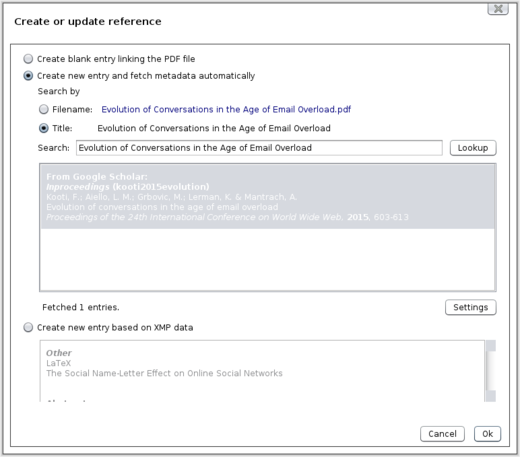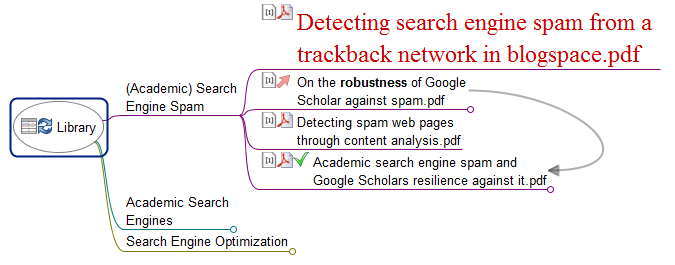
Millions of individuals in the United States suffer from some degree of hearing loss. Whether its unilateral, bilateral, conductive, or sensorineural hearing loss, just short of 50 million people are affected. As such a widespread phenomenon, it’s no surprise there are countless comorbidities associated with hearing loss. The link between diabetes and hearing loss happen to be one connection that has interested doctors and researchers alike.
Taking everything into consideration, we can say that Portable Docear is a powerful application that can greatly enhance the way you visualize ideas and organize your time, business plan or projects. Docear is an intuitive and helpful ming-mapping that features a long list of options and customization preferences for managing files, text, bookmarks and annotations, among others.It can be as a.
According to the Center for Disease Control, over 34 million people have diabetes. That correlates to a little over 10% of the population. The CDC also states that roughly 88 million people over 18 years old have a condition known as prediabetes. People with prediabetes have a high blood sugar level. The level is higher than it should be, but it isn’t quite to a level that’s considered diabetes.
- Docear is free to download, so give it a try! There are constant improvements and updates being made to Docear. You can track those on the Docear blog to stay up-to-date. There is no such thing as the perfect citation manager, but there is such a thing as the perfect citation manager for you. Docear could be the one!
- The biggest thing some other ref management software has and Docear doesn't is full text pdf search. Some people have suggested it on the forum and they seem open to adding the feature, but there's nothing for now.
That’s why there is a significant amount of interest in the connection between diabetes and hearing. This interest has led people to start asking, can diabetes cause hearing loss.
Currently, the research is a little bit vague about how diabetes is related to hearing loss. However, there is enough information to make recommendations and suggest those with diabetes to take extra precautions with their hearing.
What is Diabetes?
Simply put, diabetes is a condition where one’s blood sugar, or blood glucose, levels are too high. Glucose is a substance that comes from food and drinks eaten every day. Thus, someone with diabetes cannot effectively manage the glucose they consume. Furthermore, there are two types of diabetes, type 1 and type 2.
Type 1 diabetes is also called insulin-dependent diabetes. It’s an autoimmune condition characterized by the body’s inability to produce insulin—a hormone normally produced in the pancreas.
Normally, insulin has the function of transporting glucose inside cells for energy. This can be caused by the result of genetics or an issue with the pancreas. Individuals with type 1 diabetes must frequently measure their blood sugar, take insulin injections, plan meals, and exercise daily.
Those with type 2 diabetes, or non-insulin-dependent diabetes, typically develop the condition throughout their childhood or teenage years. It is also more common than type 1 diabetes. Individuals with type 2 diabetes can still produce insulin, but it may not be at normal levels. However, those with the condition cannot effectively use insulin as their bodies have developed a resistance to the hormone.
Type 2 diabetes forces individuals to monitor their weight, exercise, eat healthily, and, for some, take medication. Both conditions may lead to other health complications.
For instance, those with diabetes are more likely to suffer from heart disease and stroke. Both types of diabetes, although type 1 is more severe, can lead to issues with small blood vessels. Frequently, these issues arise in the kidneys, nerves, and eyes. Sometimes these issues can be seen near the ears, as well.
Can Diabetes Cause Ringing in the Ears?
As diabetes can affect small blood vessels, the condition may begin to affect blood vessels inside of the ears. This leads to the question of whether tinnitus and diabetes have concrete links. Many doctors and researchers believe there is a connection. However, more research needs to be done to establish the facts as to why diabetes can lead to tinnitus.
Regardless, tinnitus in diabetes patients is common. Diabetics may experience various types of sounds, but the commonality is that the sounds are consistent and persistent. Different individuals may experience ringing, humming, hissing, buzzing, or other sounds.
Can Diabetes Affect Your Hearing?
The most up to date research show connections between hearing and diabetes that cannot be ignored. The exact effects of diabetes remain to be discovered. However, the necessity for further research is evident.
A study funded and published by the National Institutes of Health found that adults who had diabetes were twice as likely to have hearing loss compared to individuals without diabetes. The researchers tested the hearing of a sample of adults in the US in high, mid, and low frequencies. They also had participants undergo blood glucose tests to determine who had diabetes.
The results of the studies showed that 54% of those with diabetes had a hearing impairment for high frequencies. This is compared to 32% of those who did not have diabetes. For mid to low frequencies, 21% of adults with diabetes had a hearing impairment compared to 9% of adults without diabetes.

Scientists are still not confident in exactly why diabetes is linked to hearing loss. The leading theory is that high blood sugar affects small blood vessels. Since the features of the inner ear are extremely delicate—the cochlea and hair cells, for example— when the blood vessels are damaged, the delicate features are damaged as well.
Risk Factors for Hearing Loss
Beyond diabetes, many other factors put individuals at a greater risk of developing hearing loss. For those who are diabetic, it’s important to be aware of these other risk factors. Only with knowledge can people take the necessary precautionary measures to reduce the likelihood of developing any degree of hearing loss.
Ototoxic Medications
To date, over 200 medications on the market are known to be ototoxic. This means they have a toxic effect on one’s ear or auditory nerves. These drugs may damage the hair cells inside one’s ear due to the toxic environment they create in the blood vessels within the ear.
These medications can either be prescription drugs or over the counter medications. They are typically taken for heart disease, cancer, and various infections. If you are taking a medication for any of these reasons, speak with your doctor about it to see if it is known to be ototoxic.
Missing Blood Glucose Levels
Those with often have to check their blood sugar levels. Individuals that frequently miss the required levels may put themselves at a greater risk for developing hearing loss. This is because higher blood sugar levels can harm small blood vessels.
Loud Noises
Frequent exposure to loud noises is a common cause of hearing loss. Loud noises can cause damage to the small hair cells within the inner ear. Once damaged, the hair cells cannot repair themselves. The loud noise can come from a variety of sources and environments.
People who work in factories, farming, construction, or are members of the armed forces may frequently experience loud, damaging noises. Even recreational noises can have a significant impact on one’s hearing health. For example, firearms, concerts, and jet engines are all loud enough to cause permanent damage.
Genetics
Hearing loss can be the result of genetics. In children, roughly half of all hearing loss cases are the result of genetic factors, according to the Center for Disease Control. Being aware of any family history with hearing loss may help give insight into whether you need to take extra precautions to reduce your likelihood of developing a hearing loss condition.

Other Diseases or Illnesses
Various illnesses can put individuals at a greater risk of developing hearing loss. Such diseases include mumps, meningitis, and cytomegalovirus. Meniere’s disease is another common disease that typically leads to hearing loss as well.
Docear4word
Signs of Hearing Loss
Hearing loss comes in a variety of forms and degrees of seriousness. Some telltale signs of hearing loss include the following.
- Trouble following one voice out when multiple people are talking in an area
- Having to ask people to repeat themselves frequently
- Tinnitus—a ringing in your ears
- Trouble differentiating sounds in a loud environment
- Needing the volume turned up loud on devices, TV, etc.
Docear Review
Precautions to Take If You Have Diabetes
Limit Exposure to Loud Noises
Those with diabetes should reduce their exposure to excessively loud noises. The more exposure to loud noises, the more likely ear damage occurs. To combat loud noises, consider wearing ear protection. This can dramatically dampen the loudness of sounds. Active, noise-canceling headphones produce sound waves which hinder the incoming sound waves from coming into your ears.
Docear Software
Exercise Daily
It’s well-known that exercise can improve overall health. The same is true of ear and hearing health. Incorporating regular exercise into your schedule can improve your cardiovascular health, and, subsequently, your circulation. This may help negate some of the negative effects of high blood sugar levels.
Keep an Eye on Other Conditions
If you have other health complications, such as a heart condition, pay attention to your condition. If you notice your condition, or your hearing worsens, speak to a doctor. The sooner you seek help, the sooner you can improve your condition.
Docear Alternatives
The Bottom Line
Docear Citation
Diabetes and hearing loss are inextricably linked. They are two conditions that affect a large portion of the population, and their history may forever be intertwined. As researchers explore diabetes and its effects more, further insight should come to light as to why these two conditions are linked. Until then, everyone needs to care for their hearing health. Similarly, diabetics need to practice caution for both their condition and the possibility of hearing loss onset.
